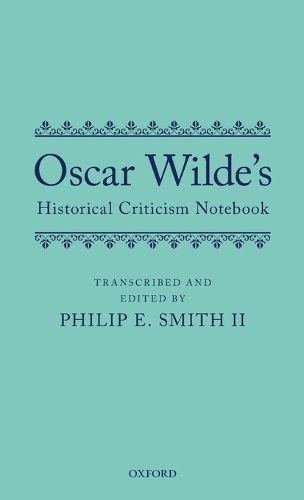Readings Newsletter
Become a Readings Member to make your shopping experience even easier.
Sign in or sign up for free!
You’re not far away from qualifying for FREE standard shipping within Australia
You’ve qualified for FREE standard shipping within Australia
The cart is loading…






This volume contains the newly transcribed and annotated text of one of Oscar Wilde’s unpublished notebooks that functioned as a major ante-text for the composition of Wilde’s first post-graduate essay, Historical Criticism, written in 1879 as an entry for the Chancellor’s English Essay Prize at Oxford. Attempting to win a fellowship at Oxford as a serious scholar, Wilde used the notebook to record his research into modern and classical historians and to formulate language that appears, often in revised form, in the essay. The notebook shows us his practices of research and composition: he often worked on particular historians or issues in sections of adjoining pages, accumulating examples from their works and composing passages describing their exemplary practices and their awareness of issues in historiography. His entries include materials drawn from classical historians and philosophers, for example, Plato, Aristotle, Herodotus, Thucydides, Polybius, Tacitus, Livy, Lucian, and Plutarch, as well as mentions and/or materials from modern historians and philosophers such as Giambattista Vico, J. G. Fichte, Victor Cousin, George Grote, G. H. Lewes, Henry T. Buckle, Robert Flint, J. A. Symonds, Alexis de Tocqueville, Hippolyte Taine, Jules Michelet, Herbert Spencer, and Ernest Renan. The notebook not only tells us much about Wilde’s practices of composing and editing the language that appears in the essay, it also contains the unused materials Wilde studied and for which he drafted language. For example, Wilde scholars will find scattered throughout the notebook the unused phrases, sentences, and notations that relate to subjects or ideas that Wilde mentions or expands in other notebook entries. These entries and drafts of his commentary are interesting in themselves as Wilde’s expanded summation of the contributions of these historians to his topic; they also reveal which episodes from history and characteristics of their historiography he found worthy of study. Finally, they show Wilde’s wit and comparative imagination at work finding parallels in early modern history and literature for his chosen examples.
$9.00 standard shipping within Australia
FREE standard shipping within Australia for orders over $100.00
Express & International shipping calculated at checkout
This volume contains the newly transcribed and annotated text of one of Oscar Wilde’s unpublished notebooks that functioned as a major ante-text for the composition of Wilde’s first post-graduate essay, Historical Criticism, written in 1879 as an entry for the Chancellor’s English Essay Prize at Oxford. Attempting to win a fellowship at Oxford as a serious scholar, Wilde used the notebook to record his research into modern and classical historians and to formulate language that appears, often in revised form, in the essay. The notebook shows us his practices of research and composition: he often worked on particular historians or issues in sections of adjoining pages, accumulating examples from their works and composing passages describing their exemplary practices and their awareness of issues in historiography. His entries include materials drawn from classical historians and philosophers, for example, Plato, Aristotle, Herodotus, Thucydides, Polybius, Tacitus, Livy, Lucian, and Plutarch, as well as mentions and/or materials from modern historians and philosophers such as Giambattista Vico, J. G. Fichte, Victor Cousin, George Grote, G. H. Lewes, Henry T. Buckle, Robert Flint, J. A. Symonds, Alexis de Tocqueville, Hippolyte Taine, Jules Michelet, Herbert Spencer, and Ernest Renan. The notebook not only tells us much about Wilde’s practices of composing and editing the language that appears in the essay, it also contains the unused materials Wilde studied and for which he drafted language. For example, Wilde scholars will find scattered throughout the notebook the unused phrases, sentences, and notations that relate to subjects or ideas that Wilde mentions or expands in other notebook entries. These entries and drafts of his commentary are interesting in themselves as Wilde’s expanded summation of the contributions of these historians to his topic; they also reveal which episodes from history and characteristics of their historiography he found worthy of study. Finally, they show Wilde’s wit and comparative imagination at work finding parallels in early modern history and literature for his chosen examples.